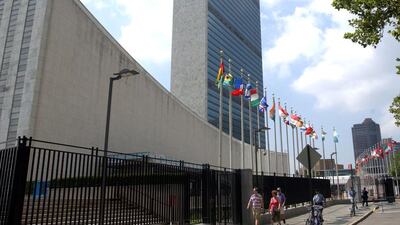As the UN General Assembly opens, representatives of 12 governments are due to meet to discuss how those accused of atrocities in Syria and Iraq can be tried, when apprehended, given that neither country is a state party to the International Criminal Court (ICC), the tribunal specifically set up to deal with crimes against humanity, war crimes and genocide.
It is a key question, but one bedevilled by the general absence of unanimity on international law and the decisions taken by the various courts, of which there are a plethora. The ICC is different, for instance, from the International Court of Justice (ICJ), which is also based in The Hague. Could the latter not serve as the arena for such prosecutions? Alas no, because while it is the principal judicial organ of the UN, it is not a criminal court and it deals not with individuals but states, which only have to accept its decisions as binding if they have accepted its jurisdiction in the first place.
Conventions on what constitutes international law are still evolving amid fervent disagreement. Many cheered when Chile’s former dictator, General Augusto Pinochet, was collared by the British police in 1998 after a Spanish judge, Baltasar Garzon, issued an international arrest warrant for him. The charges were based on alleged abuses of Spanish citizens in Chile during Pinochet’s rule in the 1970s, thus attempting a daring extension of the principle of universal jurisdiction – that some crimes are of such gravity they can be tried anywhere.
Pinochet’s lawyers protested that he had immunity under UK law as a former head of state, a line that was rejected; and he was eventually allowed to go home on the grounds of ill-health (although not before having to spend nearly 18 months staying on the Wentworth Estate, a luxury development outside London populated by so many so-called celebrities that some wags suggested that that had been a form of punishment in itself).
The case transfixed so many because of the astonishing uncertainties it raised. Could the former president really be extradited to Spain over acts that took place on Chilean soil? What, then, did this mean for international law?
Given the crucial nature of the rule of law, and its acceptance by all, some guidelines as to how local and international courts should deal with crimes of gravity might be useful.
First, for universal jurisdiction of the Pinochet case variety to become a reality, it must be validated by every country in the world, and with all meeting globally recognised standards of a free and impartial judiciary – a near-impossible challenge. This is one of the reasons why the former US secretary of state, Henry Kissinger, is an opponent of the very concept, warning in a celebrated essay for Foreign Affairs that it risked “substituting the tyranny of judges for that of governments”. But even if you disagree with him on that, he had a point when he wrote that the writ of international institutions can only be borne by countries that have signed up to them. The “attempt of the ICC to assert jurisdiction over Americans even in the absence of US accession to the treaty,” he correctly added, was “extraordinary”. So far, 122 countries have signed up to and ratified the statute that set up the ICC. It has a long way to go.
Second, for a body such as the ICC to win approval, it must not just be fair in its dispensation of the law; it must be seen to be fair. So far, all eight cases that the ICC has looked into have been in Africa, leading to suggestions that it is effectively an instrument of “imperial” western powers. This is a perception that must be remedied swiftly.
Third, the ICC has to give greater weight to its own self-avowed limitations. Article 17 of its founding statute states that it should not be involved if “the case is being investigated or prosecuted by a State which has jurisdiction over it, unless the State is unwilling or unable genuinely to carry out the investigation or prosecution”. Given the situation now, the ICC’s demand that Libya hand over the late Colonel Muammar Qaddafi’s son Saif to its jurisdiction may have seemed prudent. (As far as is known, he remains in the hands of a Zintani militia, and his chances of a fair trial of any kind appear to be ever diminishing amid the chaos in the country.) At the time of his arrest by Libyan authorities in November 2011, however, the desire to see the late dictator’s son brought to justice in the country he had helped oppress should be viewed as eminently understandable – and underscored by precedent.
Marshal Philippe Petain, the Second World War leader of collaborationist France, was tried and convicted of treason at home. More recently, Khmer Rouge leaders have finally faced the law, albeit under the aegis of the UN, in Cambodia.
Fourth, international law should hesitate before attempting to haul before foreign courts those who have been democratically elected subsequent to their alleged crimes. Uhuru Kenyatta won the Kenyan presidency in a vote widely considered free and fair in 2013, despite facing charges from the ICC. The case has recently collapsed, but what did it say about the global community’s respect for Kenyans’ democratic decision that their president was publicly declared “committed to trial” by the ICC?
If a free Syria and Iraq can try their own in the future, that should be welcomed. If the international community decides in the meantime that they can’t, it must make every effort to avoid any charges of partisanship or political motive. Nothing less than the sanctity and universality of justice is at stake.
Sholto Byrnes is a Doha-based commentator and consultant


